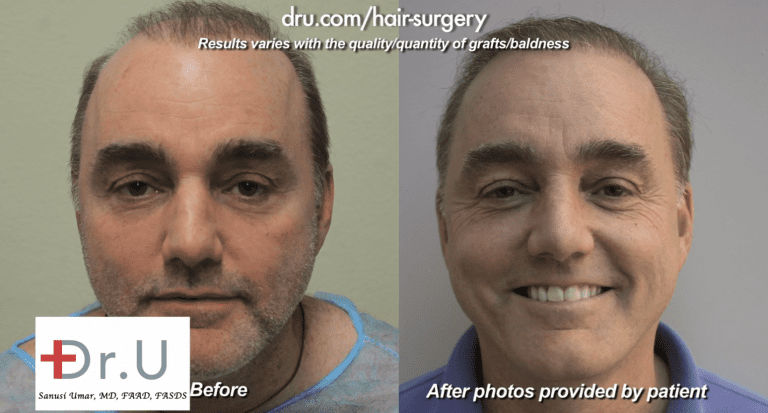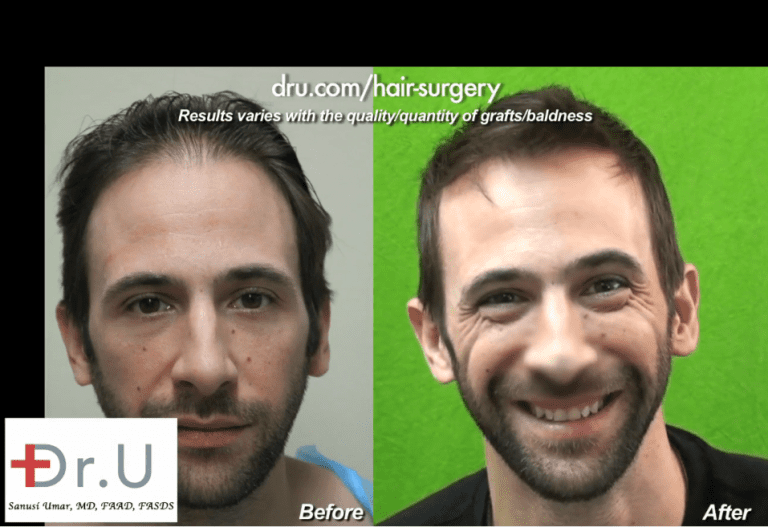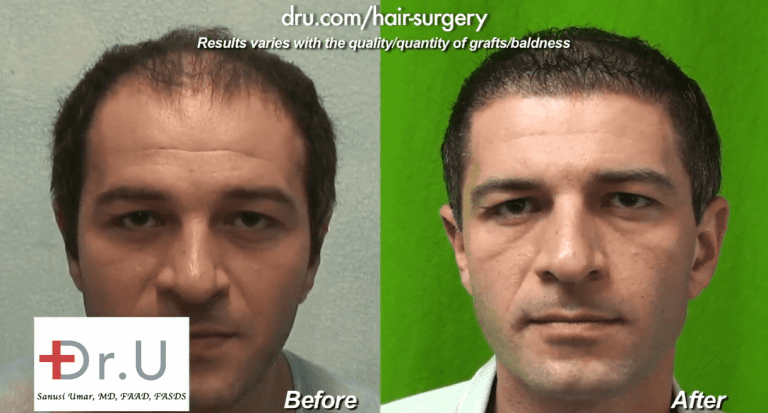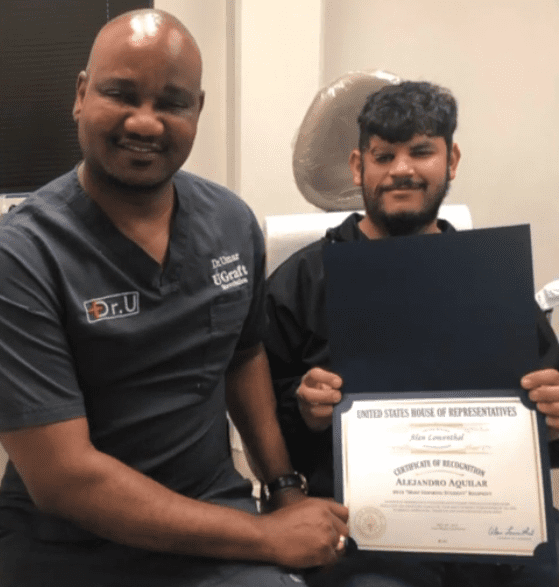One way to describe hair transplant success is through quantitative measures such as the number of donor grafts used, low transection rates, growth yield percentages, symmetry, and proportion. But in the end, it is qualitatively determined by how the patient perceives their outcome. According to Dr.U, a person can achieve the coverage and aesthetics that they planned for with their doctor which garners genuine positive feedback from others. And yet, they can still feel unhappy about their results. Likewise, another individual with the same extent of baldness may receive fewer grafts and feel ecstatic about their outcome. Hair transplant patient satisfaction ultimately rests on a wide range of considerations. These include objective and subjective factors, as well as a state of inner well-being and maintaining realistic expectations about how their appearance and life will improve after their surgery.
Dr.U encourages both patients and surgeons to explore and understand not just the visual details which contribute to a most rewarding hair transplant experience, but also the psychological elements.
Beyond Technique – Redefining the Role of Today’s Hair Transplant Provider
Patients count on their hair transplant providers for help to restore hair growth. But they also view them as a source of personal support to alleviate their overall state of distress caused by their hair loss. However, it is also important to realize that much of this emotional experience is also connected to circumstances and personal histories beyond their hair loss, such as low self-esteem.
Hair loss can drastically alter a person’s relationship with themselves. And this, in turn, can have a less-than-positive impact on how they relate to others in their career and personal lives.
While techniques and their execution comprise one aspect of the hair transplant experience, a deeper understanding of the emotional and psychological impact of hair loss can further enhance the quality of care that patients receive from their providers. Putting such insights into practice can surely enhance hair transplant patient satisfaction. Here is a look at several studies which shed more light on these topic areas.

Insights and Studies on Hair Loss And Psychology
In one study called, Psychological Problems with Hair Loss in General Practice and the Treatment Policies of General Practitioners, researchers found that as many as 50% of patients with hair loss who received treatment from general practitioners had psychological problems. Males generally suffered from low self-esteem. And females tended to experience fear and anxiety. However, the general practitioners applied the same processes and policies for those with hair loss and those without. The study concluded that patients with hair loss may require more psychological support from their doctors.
In another publication, entitled, The Psychological Impact of Alopecia, the authors discussed how alopecia may lead to psychological issues such as anxiety and depression. Using informational networks like Medline, PsychINFO, Science Direct, the Cochrane Library and the Web of Science, they searched for studies related to psychological treatment for hair loss sufferers (excluding androgenic alopecia). Examples of search terms used included: alopecia, stress, psychology, treatment, anxiety, depression, trauma.
The authors found very little research on the effectiveness of psychology interventions on behalf of hair loss sufferers. They emphasized the importance of recognizing the likelihood of psychological issues within hair loss sufferers. They also recommend that doctors help guide patients towards better psychological responses to alopecia. Physicians who do not specialize in these areas should refer more serious cases to clinical psychologists or psychiatric services who have experience in addressing these types of psychological symptoms can, therefore, provide appropriate forms of treatment.
Psychology and Cosmetic Surgery- Hair Transplant Patient Satisfaction Is Contingent on Inner Well Being

Some studies have been conducted on the effects of cosmetic procedures on an individual’s self-esteem and confidence.
In one study published by Clinical Psychological Science, entitled, Research Ties Plastic Surgery to Higher Self Esteem to Higher Self Esteem and Better Mood (2013), researchers found that patients in general, who underwent plastic surgery experienced more joy across life situations, better self-esteem, and higher overall satisfaction. Although this research focused on plastic surgery procedures, and not hair transplantation, the overall implications of the results are still worth noting.
The study involved 550 first time patients 220 individuals who wanted plastic surgery but decided not to commit to a procedure. They showed no differences in terms of general life satisfaction and mental health when compared to a group of 1000 individuals who indicated no interested in cosmetic procedures.
The patients who decided to undergo surgery were given psychological tests before and after their procedure, at three, six and twelve months. Their expectations were also assessed prior to their operation, with questions like “all my problems will be solved” and “I will be a completely new person.” However, only 12% believed these statements to be true.
The patients who had surgery performed higher than the subjects who chose to not go through with a procedure in terms of self-esteem, anxiety and their overall happiness.
In another study entitled, Does Cosmetic Surgery Improve Psychosocial Well Being? ( David Castle, Roberta J. Honigman, and Katherine Phillips ) , the research authors acknowledge that most people end up happy with the results of their cosmetic procedures. However, satisfaction levels will depend on their expectations and their state of mental and emotional health. Individuals with a psychiatric condition called body dysmorphic disorder respond poorly to their outcomes. These individuals tend to obsess excessively over a particular area of their body. With an objectively successful outcome, they will report that the procedure was unsatisfactory and did not improve their concerns over their appearance.
Other factors that predict poor psychosocial outcomes following a procedure include:
- being a young male
- indications of depression or anxiety
- having a personality disorder
The degree and nature of the surgical alteration was also important, whether they are structural or restorative changes (e.g. facelift)
According to the authors, it is important for surgeons to determine which individuals are more likely to face poor psychosocial results after their procedure.
Their recommendations include:
- evaluating the individual’s attitude towards their cosmetic issue, along with their distress levels
- whether their perceived problem is slight, or exacerbated and whether it is actually trivial compared to their beliefs about it.
- how much time they spend worrying about their perceived physical flaw
- assessing their expectations about how their appearance and life will change
- how many past procedures they’ve had and how they rated them
Patients with BDD can be treated through professional psychiatric help with serotinin reuptake inhibitors and cognitive behavior therapy. These interventions have shown to be effective in about ⅔’s of patients with BDD. In the context of hair transplant patient satisfaction, surgeons can work on helping patients seek appropriate forms of support for any emotional or psychological difficulties they may be facing.
A Study on Hair Transplant Patient Satisfaction and Self Esteem

In a research study called, The Relationship Between Self Esteem and Hair Transplantation Satisfaction in Male Androgenic Alopecia Patients (J. Cosmetic Dermatology) 2013 Lui F, Miao Y, Li X et. al, researchers studied the impact of hair transplantation on the variables of self-esteem and satisfaction levels with appearance. They assessed satisfaction before and after the patients’ procedures.
Self-esteem was measured using the Rosenberg Self Esteem Scale (RSES). Satisfaction ( in terms of appearance, visual age, and expected visual age) were assessed with the Face-Q Scale
1106 patients were studied. And 875 completed post-operative questions following their procedures. Patients with lower self-esteem tested poorly with post-operative satisfaction than those with healthy self-esteem.
According to the authors, hair transplant surgeons should not only focus on the quality of the procedure but also work with patients based on their psychosocial state to offer appropriate forms of guidance.

Having Realistic Expectations After A Hair Transplant
Hair transplant surgery can certainly improve one’s appearance. But the results themselves will not fix a patient’s relationships and outward, day to day life. Patients must have a healthy psychological foundation in place based on self-confidence, self-esteem and inner peace with who they are and how they relate to the world in order to experience a fulfilling outcome. Providers should work with patients to set realistic expectations and also help them accept themselves and provide guidance on how they can improve their overall inner well being. This can go a long way towards improving hair transplant patient satisfaction.
If you are interested in speaking with Dr.U further about topics on psychological and emotional well-being before and after a hair transplant surgery, click the Ask Dr.U button below:
Frequently Asked Questions – Hair Transplant Patient Satisfaction
I want to know how to be happy with your appearance after a hair transplant surgery. What are the best steps to take in this direction?
If you are asking, how to experience the most fulfillment after a procedure, it would be important to evaluate your life and how you feel about yourself. Avoid the habit of comparing yourself or your life to others. But instead, look at these factors for yourself. Also, it may help to find support groups with people who are also learning how to improve their self-esteem and confidence. These can be found online or in actual meeting organizations. Read encouraging books, or listen to audio that helps you feel better about yourself and your life circumstances. If necessary, you may also want to consider professional counseling.
What does it mean to have self-confidence after a hair transplant procedure?
Having self-confidence after a hair transplant procedure means having a clear understanding that just the hair loss itself was the cause for feeling dissatisfied with your appearance. So restoring hair through surgical means should help a person with a healthy psychosocial state to experience more self-confidence and overall happiness with their procedure.
Hair transplant patient satisfaction and confidence should ideally be cultivated by having a positive assessment of oneself. This, in turn, affects how a person relates to others, independent of their physical appearance. It is very important for patients to work towards this end on a continual basis in order to experience the most from their procedures. Focusing on their own personal strengths and building a network of positive social relationships can be helpful in these efforts.
If hair transplant patient satisfaction is subjective, what can patients and doctors do to help improve this area?
Doctors and patients can review research studies on how inner well being affects one’s experience of their results, after their procedure. It is also important to clarify the objective elements of a procedure and compare this to how an individual subjectively feels. General discussions can also be held to find effective ways of developing stronger healthier confidence and self-esteem apart from physical appearance. This will help individuals establish emotional foundations necessary to fully enjoy their outcomes. These types of measures represent positive steps for improving hair transplant patient satisfaction.
Further Reading
References
E.B.G. De Koning, J. Passchier et. al., Psychological Problems with Hair Loss in General Practice and the Treatment Policies of General Practitioners, 1990

